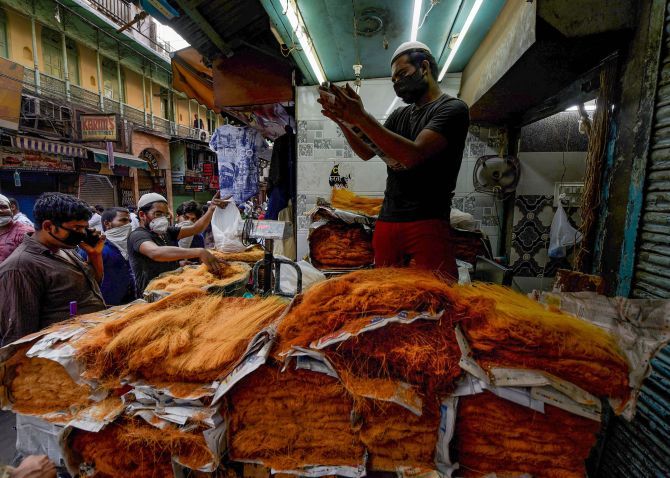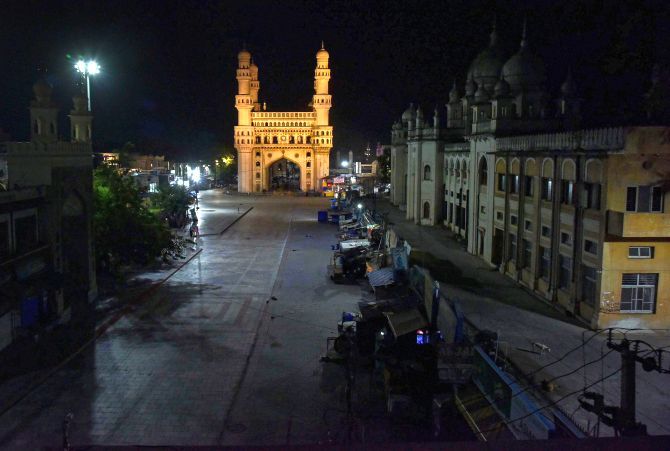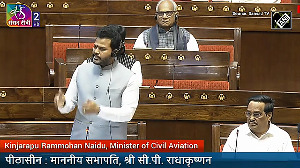Celebrations on Eid-ul-Fitr were subdued in Kerala and Jammu and Kashmir on Sunday with no major congregational prayers and community feasts due to the coronavirus lockdown.

While Eid will be celebrated in the rest of the country on Monday, the festive buzz was missing as markets and other public places remained deserted, whether it was in Lucknow, Kolkata or the old Delhi areas as people mostly remained indoors.
Major mosques and idghas, which see tens of thousands of people offering namaz on Eid and then embracing each other, remained mostly empty perhaps for the first time on the festival as the government has prohibited all kinds of religious gatherings to prevent the spread of the coronavirus.
In his message, President Ram Nath Kovind asked citizens to reaffirm their belief "in sharing with and caring for the most vulnerable sections of society".
He also asked people to resolve to adhere to social distancing norms and all other precautions to stay safe and overcome the coronavirus challenge soon.
Prominent clerics and religious organisations like Jamiat Ulema-e-Hind have also appealed to people to adhere to social distancing and lockdown guidelines of the government and stay at home to offer Eid namaz.
In Palayam mosque in Thiruvananthapuram, the cleric live-streamed the Eid prayers for the faithful.
Many joined their families and friends on video calls as lockdown restrictions prevented them from travelling.

The Kerala government had eased the curbs on Sunday in view of Eid, but the festival was shorn of its usual gaiety and not many people ventured out.
Governor Arif Mohammed Khan and Kerala chief minister Pinarayi Vijayan greeted the people on Eid, mentioning that the world was passing through a difficult time due to the pandemic.
"May we also have the blessing to prevent and eliminate the COVID-19 disease," Khan tweeted.
Vijayan said the world is going through "an unprecedented crisis and misery" because of pandemic COVID-19.
"
Usual celebration during Ramzan is not there anywhere in the world due to the pandemic. Instead of offering prayers at mosques, which is important for Muslims, this time the prayers and the feast is performed in their homes. Community leaders have taken this important decision to protect the interests of the society" he added.
The chief minister said Eid-ul-Fitr gives out a message of equality, tolerance and repentance.
No mass congregations were held in major mosques and shrines of Kashmir as police enforced restrictions in most parts of the valley including Srinagar city, officials said.
Last year too, authorities had imposed strict curfew in the wake of abrogation of Article 370 and division of Jammu and Kashmir state into two union territories.

People preferred to offer Eid prayers at home, either individually or in small groups comprising family members, on Sunday.
However, there have been reports of congregation Eid prayers being offered in mosques located in the interior parts of cities and towns.
Jammu and Kashmir Lieutenant Governor Girish Chandra Murmu had urged the people to adhere to the guidelines and norms issued by the administration while celebrating the festival.
“The festival is one of many examples of India's multi-dimensional culture. May this festival promote and maintain inter-religious understanding and co-existence and instill the spirit of brotherhood, harmony, and amity among the people of all faiths,” he said.
Police personnel made announcements early in the morning on public address systems, appealing people not to congregate for Eid prayers as restrictions were still in place as part of the lockdown.
Eid elebrations were also muted in the coastal districts of Dakshina Kannada and Udupi in Karnataka.
The Eidgah maidan at Bavuta Gudde in Mangaluru, where thousands used to gather to offer namaz as part of the festival, was empty.
India has reported 1,31,868 COVID-19 cases till Sunday with a total of 3,867 fatalities.

The country has been under lockdown since March 25, though the restrictions have been eased for the fourth phase after May 17.
In Delhi, the old city areas, which are usually crowded during Ramzan as people go for shopping to buy new clothes for the festival, were quiet.
Mohammad Mohsin, a footwear trader in Ballimaran, said, "You cannot imagine celebrating Eid without participating in Eid namaz at a mosque. People also don't have money as commercial and business activities have been paralysed over the past two months."
With coronavirus cases increasing in the city, people have been staying at their homes and observing social distancing norms by avoiding crowded places.
"Main markets, where it would be difficult to move during normal days, more so on the occasion of Eid, are deserted. Shops are not opening because the entire supply chain has been disrupted in the country and also because people do not have money to spend," Akram Qureshi, president of Bazar Matia Mahal Traders Association, said.
However, some people in inner parts and narrow bylanes of the old city areas of Matia Mahal, Chandni Chowk, Ballimaran visited shops to buy food items and new clothes for their children to celebrate Eid.

In Lucknow, the once busy streets of Aminabad, Nazirabad, Fatehganj, La Touche Road and Kaisarbagh were also silent.
"We have asked everyone to offer Eid namaaz (prayers) at their home. Celebrate Eid at your homes. Only the 4-5 persons who stay in a mosque will be offering the prayers at the mosque. Greet people through the social media. Do not shake hands or embrace or hug anyone. Apart from this, 50 per cent of Eid budget should be given to the poor," prominent Muslim cleric Maulana Khalid Rashid Farangi Mahali said.
The Zakaria street on Kolkata, which comes to life with ubiquitous haleem and kebab stalls during iftar, too was missing the hustle and bustle.
Zeeshan Ali, a 25-year old techie, said it breaks his heart to think that he would have to spend the occasion without meeting friends, and exchanging gifts.
"I will miss the usual practice of waking up early and rushing to Red Road at 6 am to offer Namaz with my father. Also, I won't get to meet my friends. That's heart-breaking... Offering prayers within the confines of the four walls on Eid, however, will be an altogether different experience," Ali, a resident of the city's Bowbazar area, said.
Vadodara-based Intekhab Sheikh said he will offer the Eid prayers at his home and exchange greetings via video chatting.
"Visiting a mosque is out of question. We will cook sewaiyanat home. At the most will offer it to our neighbours. Offering prayers and consuming sewaiyan with family members will be our mode of celebration tomorrow. And as far as greeting friends and relatives are concerned, we will do it through video calling," he said.
Eid-ul-fitr marks the end of the fasting month of Ramzan.










